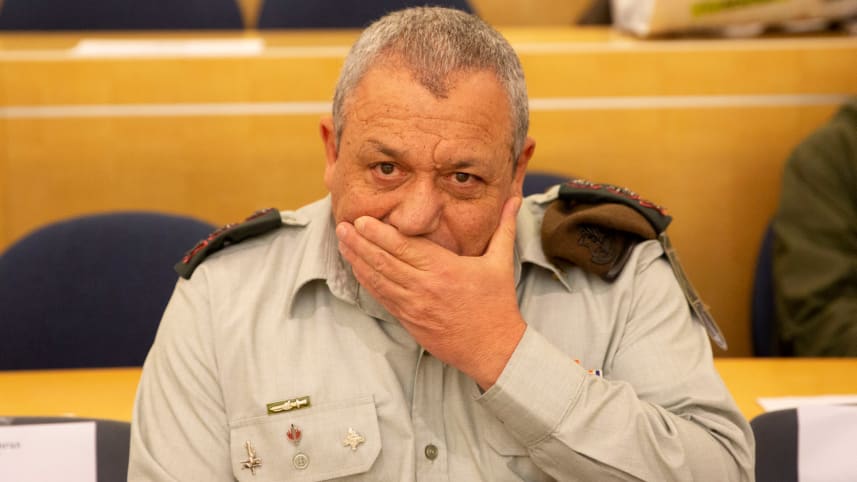Analysis/Outgoing Israeli Army Chief Sends Stark Message to Politicians: Bluster Won’t Stop Terror
تحليل سيلسي من الهآرتس بقلم عاموس هاريل: رسالة رئيس الأركان الإسرائيلي المنتهية ولايته تقول للسياسيين بأن التبجح لا يوقف الإرهاب
Amos Harel/Haaretz/December 24/18
Gadi Eisenkot, who has stood up resolutely to efforts to pressure him, rebuked politicians in parting words for ‘emotional decisions’.
Gadi Eisenkot’s speech on Sunday was one of his last public appearances as the Israel Defense Forces’ chief of staff before his term ends in mid-January. He was speaking, as he does every year, at a conference in honor of former Chief of Staff Amnon Lipkin-Shahak at the Interdisciplinary Center in Herzliya.
Two years ago, he sparked a minor storm by saying “An 18-year-old boy who is drafted isn’t everyone’s son,” a reference to both Elor Azaria, the soldier convicted of killing a Palestinian assailant who was already lying on the ground wounded, and kidnapped soldier Gilad Shalit. This year as well, he didn’t bother too much with diplomatic niceties.
In recent days, senior Western defense officials, apparently including those in Israel, have heard their American counterparts’ severe frustration over U.S. President Donald Trump’s policies, and particularly his decision to withdraw American forces from Syria. Eisenkot never had to do anything as drastic as Secretary of Defense James Mattis, who resigned this weekend. But his hints about some of his conflicts with his own government in recent years sometimes sounded like an echo of Mattis’ remarks in his resignation letter.
Eisenkot said that the calls for drastic measures against West Bank Palestinians don’t help the IDF provide either actual security or a sense of security to Israelis. The idea that terror attacks would stop if Israel just used more unbridled force is mistaken, he continued.
As for recent events in the Gaza Strip, Eisenkot denied that Israel’s deterrence has collapsed. The IDF isn’t afraid to use force, he added, but it does so in a judicious manner “that will bring about a better situation the day after.”
Unusually, however, he admitted that “we haven’t managed to provide a good sense of security over the last three years” to residents of communities near Gaza. “This sense of security has been undermined by the primitive patterns of behavior the enemy developed,” he said.
Nevertheless, he added, “decisions must made sensibly, not emotionally.” This was apparently a jab at minister Naftali Bennett and former minister Avigdor Lieberman, both of whom accused the IDF of weakness in Gaza.
Eisenkot sounded as if he were summing up his term for himself. On the Palestinian front, he has consistently advocated a judicious policy, which has included refusing to follow politicians’ calls for imposing collective punishment in response to a wave of stabbing and car-ramming attacks in autumn 2015.
Toward Iran, Hezbollah and Syria, however, his policy has been utterly different. That was evident on Sunday as well, when he mentioned a series of IDF strikes on Iranian targets in Syria earlier this year and the ongoing effort to destroy Hezbollah’s cross-border tunnels from Lebanon.
These policies aren’t mutually contradictory. Eisenkot believes the IDF’s moves on both fronts serve the same goal – weakening the enemy and distancing war. In his view, a sober analysis of the threats and a controlled use of force at varying intensities are the right response to the different trends on these two distinct fronts.
In various forums recently, Eisenkot has frequently referred to his time as commander of the IDF forces in the West Bank at the height of the second intifada. His experience confronting suicide bombers there puts what Israel has faced more recently in proportion – first, the wave of lone-wolf attacks three years ago, and this month, several shooting attacks apparently perpetrated by a single Hamas cell over the course of a few days. That level of terror can’t justify the recent demands for demolishing the homes of terrorists’ families or deporting their relatives wholesale.
As if to remind us of the political conditions under which the military brass operates in the territories, on Sunday, Culture Minister Miri Regev (who is periodically invited to security cabinet meetings by the prime minister) attended the dedication of two new prefab homes in the evacuated settlement outpost of Amona – homes built on privately owned Palestinian land, in a closed military zone and without the requisite permits. In the end, she decided to speak with the media just outside the closed military zone.
Regev, who was invited by the Binyamin Regional Council, ignored Attorney General Avichai Mendelblit’s criticism of these homes. With early elections likely to be called soon, some ministers can’t be bothered with legal trivialities like that.
Throughout his term, Eisenkot has stood up resolutely to politicians’ efforts to pressure him, especially in the territories. One must hope this will still be the case as he passes the reins to his designated successor, Maj. Gen. Aviv Kochavi.






















